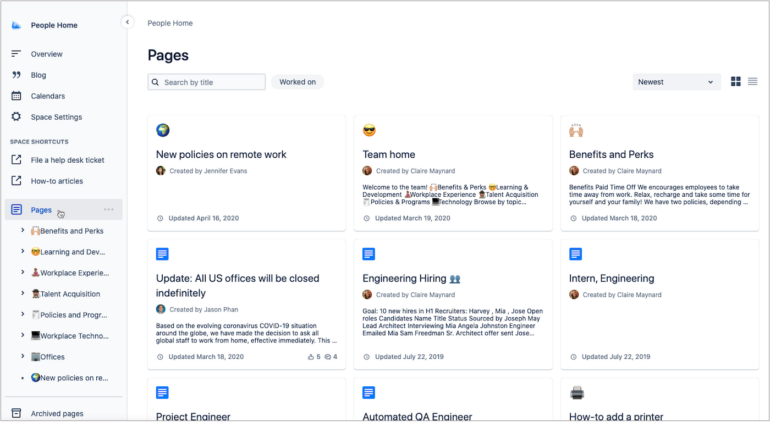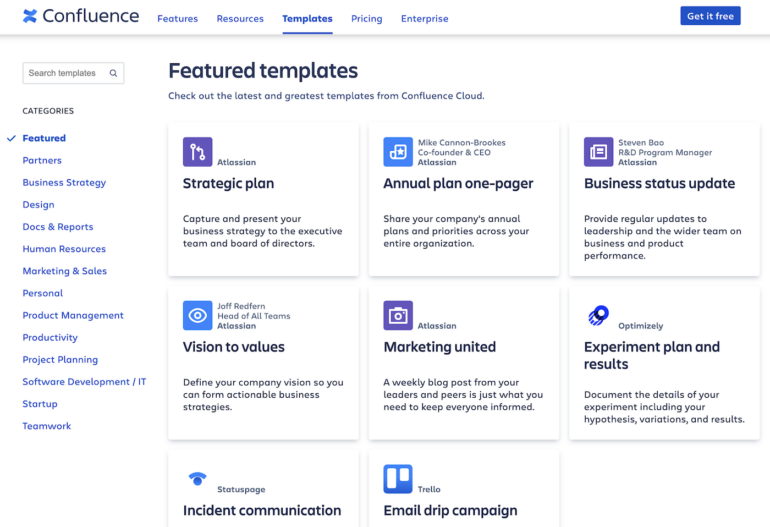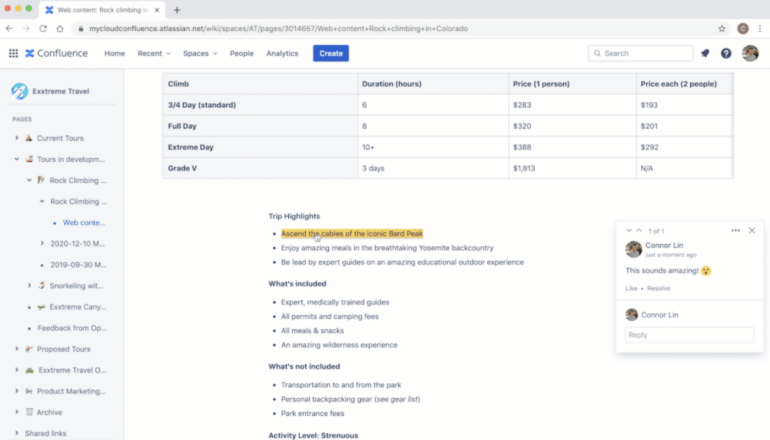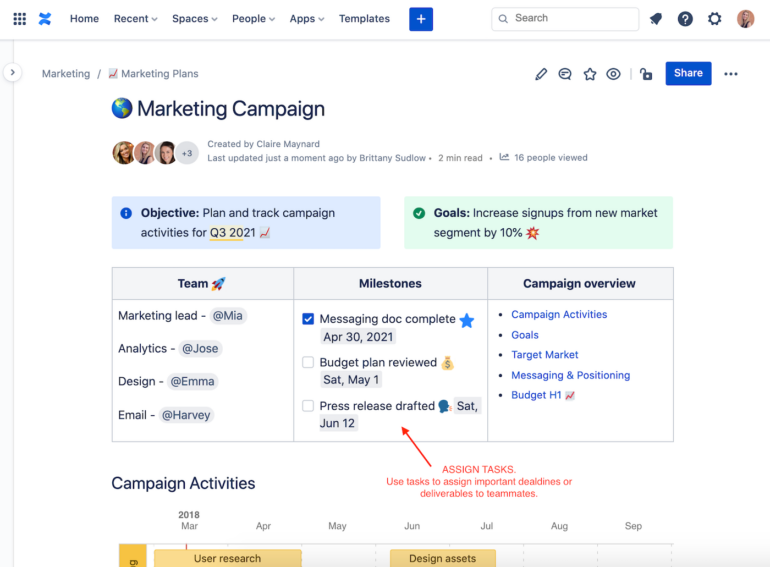
Confluence is a knowledge, collaboration and project management software app created by Atlassian. It syncs with other Atlassian projects, including Jira and Trello, and offers the excellent security measures that Atlassian is known for. Confluence can be accessed via your web browser and through iOS and Android mobile apps. While some existing accounts can be hosted on-premises, Atlassian is not accepting new licenses and is ending support for self-hosted servers in February 2024.
The forever free plan covers up to 10 users and offers 2 GB of storage as well as unlimited spaces and pages. Because of the cap on users, this is best for individual use and very small teams.
The Standard plan costs $5.75 per user per month, billed monthly, for up to 50,000 users. This plan offers 250 GB of file storage, local business hours customer support and the ability to invite collaborators as guests. A 7-day free trial is available for this plan.
The Premium plan costs $11 per user per month, billed monthly. This plan includes unlimited storage, analytics, 24/7 premium support, team calendars and 99.9% uptime SLA. A 7-day free trial is available for this plan.
The Enterprise plan requires you to contact the sales team to get a custom quote. This plan includes unlimited sites, Atlassian Access security, 24/7 enterprise support and 99.95% uptime SLA.
Confluence allows teams to create and manage knowledge bases to encourage information sharing and transparency. First, start by creating a site, then create spaces within that site, and populate each space with individual pages (Figure A). Add different design elements such as a video, images, graph and/or table to break up the text, or include dynamic content using macros. Hit Publish when you’re done making edits and are ready to share your page with the rest of your team.
Figure A
You can create your own pages from scratch, but it will be much faster if you take advantage of Confluence’s pre-built templates (Figure B). Choose from more than 70 templates across a wide variety of categories, including business strategy, human resources, marketing and sales, product management and software development. Create a page using a template and add it to your site with just two clicks, or create your own template from an existing page.
Figure B

As your knowledge base grows to hundreds of pages, you need to be able to find content within it easily. You can keep things organized with a nested page tree and use space shortcuts to navigate to often-used pages. Confluence also offers an advanced search function (Figure C) that lets you use boolean operators and other elements to find exactly what you need. Search for similarly spelled words, words in proximity or words within a certain alphabetical range to find exactly what you need.
Figure C

Knowledge bases aren’t created in a vacuum, and Confluence makes it easy to collaborate with team members on creating and editing documents in real time. You can invite users and change permissions so that spaces and pages are shared with the right people. You can also leave a comment on a page (Figure D), notify a teammate with an @ mention or like a comment to acknowledge that you’ve read it.
Figure D

While Confluence was primarily designed for knowledge management, not project management, it does offer some project management features — just not as many as Trello and Jira. You can create, share and update project plans in the tool, which offers a handful of pre-built project management templates. You can also assign tasks with @ mentions (Figure E) and keep everyone updated with status updates on the project plan.
Figure E

However, Confluence lacks more advanced features that dedicated project management apps have, such as Gantt charts and Kanban boards. See our Jira vs. Confluence comparison to learn more about the differences between the two platforms.
In addition to integrating with Atlassian products, Confluence also offers pre-built integrations with third-party apps. Some of the most popular are:
Confluence is a great choice for teams that need knowledge management and file sharing capabilities that go beyond creating a simple wiki. Its interface is intuitive and highly visual, and it offers way more possibilities than Google Docs or Microsoft Word. Its collaboration tools make it easy to work with teammates to create and edit documents and files, and it offers excellent security measures to safeguard your information. Its advanced search also makes it easy to find the exact page you’re looking for, even in a huge knowledge base with hundreds or thousands of pages.
While Confluence can be used for simple project management, it’s not the right choice for businesses that need more robust task and project management features. The tool’s time tracking feature is rudimentary compared to alternatives; you must pay for an extra add-on to get Gantt charts, and it lacks Kanban boards and budgeting tools completely.
Confluence’s knowledge management tools might be too advanced for teams that just need to create a simple wiki. On the flip side, its project management features aren’t robust enough for teams that are looking to manage complex projects. If Confluence isn’t an exact fit for your needs, here are some alternatives to consider:
| Confluence | Trello | Notion | SharePoint | |
|---|---|---|---|---|
| Knowledge management | Yes | No | Yes | Yes |
| Project management | Yes | Yes | Yes | No |
| Team collaboration | Yes | Yes | Yes | Yes |
| Forever free plan | Yes | Yes | Yes | No |
| Starting price for paid plans | $5.75 per user per month | $5 per user per month | $8 per user per month | $5 per user per month |
If you want to stay within the Atlassian ecosystem for your project management needs, then consider Trello, which was acquired by Atlassian in 2017. Trello is known for its intuitive Kanban boards and easy-to-use task and project management features. It integrates seamlessly with other Atlassian products, including Confluence, so you could conceivably use Trello for project management and Confluence for knowledge management. Read our full Trello review.
If you are mostly looking for a document and knowledge management app, then Notion is a good alternative to consider. Notion’s knowledge management tools are less complex than Confluence’s features and present less of a learning curve as a result. Notion also includes native project management features, so you can do it all in one tool, though it probably won’t be enough for power users managing very complicated projects. Read our full Notion review.
This tool helps teams create sites to share files and collaborate on documents. As part of the Microsoft ecosystem, SharePoint is a good choice for organizations that are already using other Microsoft products, such as Teams. It is available as a standalone plan and is included as part of the Microsoft 365 cloud-based plan as well. It can also be deployed on an on-premise server.
During the writing of this Confluence review, we signed up for a free trial of the Standard plan and also consulted product documentation and user reviews. We weighed factors such as pricing, ease of use, user interface design and integrations. We also consider other criteria such as the number of templates, team collaboration features and project management tools.